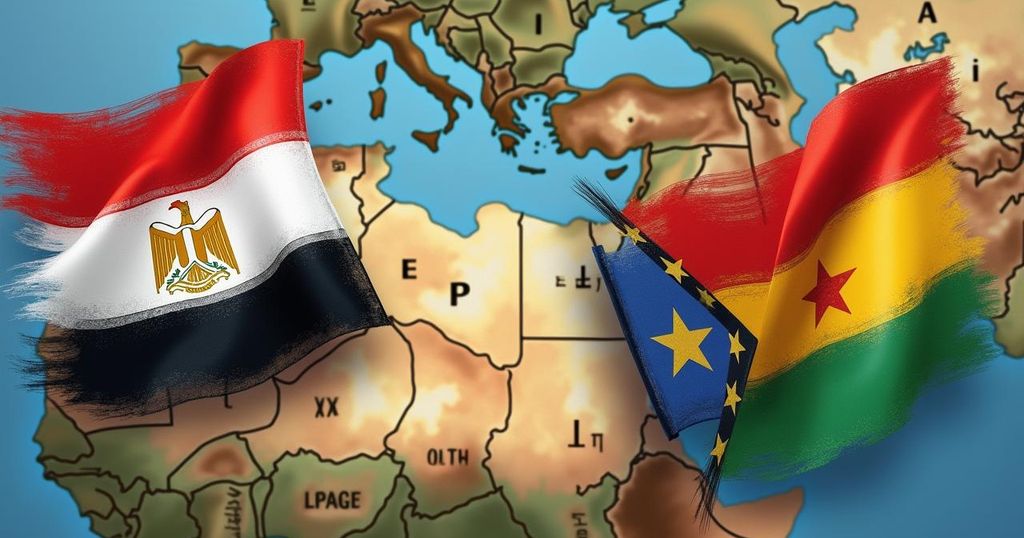Egypt is forming a security alliance with Somalia and Eritrea amid regional tensions, aiming to address security concerns regarding Ethiopia. The new partnership involves military cooperation and support, particularly in light of Ethiopia’s recent agreements with Somaliland.
Egypt is working to establish a new security alliance with Somalia and Eritrea amidst escalating tensions in the Horn of Africa. Egyptian President Abdel Fattah al-Sisi recently visited Asmara, Eritrea, where he engaged in discussions with Somali President Hassan Sheikh Mohamud and Eritrean President Isaias Afwerki. This strategic meeting aims to bolster trilateral relations and ensure stability in the region, particularly concerning shared security interests. Previously, President Mohamud and President Afwerki had held bilateral talks focused on regional and international matters deemed crucial for mutual interest. A key outcome of their discussions was the agreement on enhancing defense cooperation and protecting each country’s sovereignty, implicitly addressing concerns surrounding Ethiopia’s actions in the region. The Eritrean Ministry of Information highlighted the importance of developing robust structures for national security. Eritrea has been training Somali National Army troops over the past three years, but the involvement of Egypt is particularly noteworthy in light of recent developments. Egypt has formalized a defense cooperation agreement with Somalia, committing to train Somali forces, equip them with necessary resources, and provide troops for a soon-to-be-established African Union mission replacing the current one in Somalia. This collaboration appears to be a strategic move to circumvent Ethiopian influence, particularly following a contentious memorandum of understanding between Ethiopia and Somaliland regarding territorial control and access to the sea. Somalia has persistently accused Ethiopia of overstepping its bounds in Somali internal affairs. Despite Ethiopia’s participation in Somali security operations, it has expressed concerns regarding Egypt’s military support to Somalia, particularly the potential for weaponry to be mismanaged and fall into the hands of al-Shabaab militants. This trilateral alliance may offer Somalia much-needed support against Ethiopia, though for Egypt, it serves to secure its interests in the Red Sea, isolating Ethiopia, which has become an adversary due to the Grand Ethiopian Renaissance Dam. Eritrea, having long-standing conflicts with Ethiopia, may view this alliance as an opportunity to re-establish its influence in the region. Previous attempts at collaboration among Somalia, Ethiopia, and Eritrea appear to have been superseded by this new partnership. Consequently, Egypt’s recent diplomatic efforts indicates a pivot in how regional politics are managed, particularly concerning security and territorial integrity in the Horn of Africa. Furthermore, concerns regarding national security are exacerbated by the increasing presence of external threats, as evidenced by recent attacks on maritime traffic in the Red Sea, to which Egypt is especially sensitive due to its reliance on the Suez Canal.
The Horn of Africa has long been a complex geopolitical landscape, affected by historical tensions and contemporary conflicts. Recent engagement between Egypt, Somalia, and Eritrea signifies an evolving dynamic in response to regional disputes, particularly involving Ethiopia. The formation of alliances is often driven by shared interests in territorial integrity, security operations, and the management of critical resources, such as the Nile River, which has instigated disputes over dam constructions affecting downstream countries, notably Egypt.
In summary, the emergent alliance between Egypt, Somalia, and Eritrea highlights a significant shift in regional cooperation and security strategies in the Horn of Africa. By consolidating their positions against Ethiopia, each member aims to fortify its sovereignty and enhance its national defense systems amidst growing regional instability. As this situation unfolds, the implications for regional security and political relations will warrant close observation.
Original Source: nation.africa






